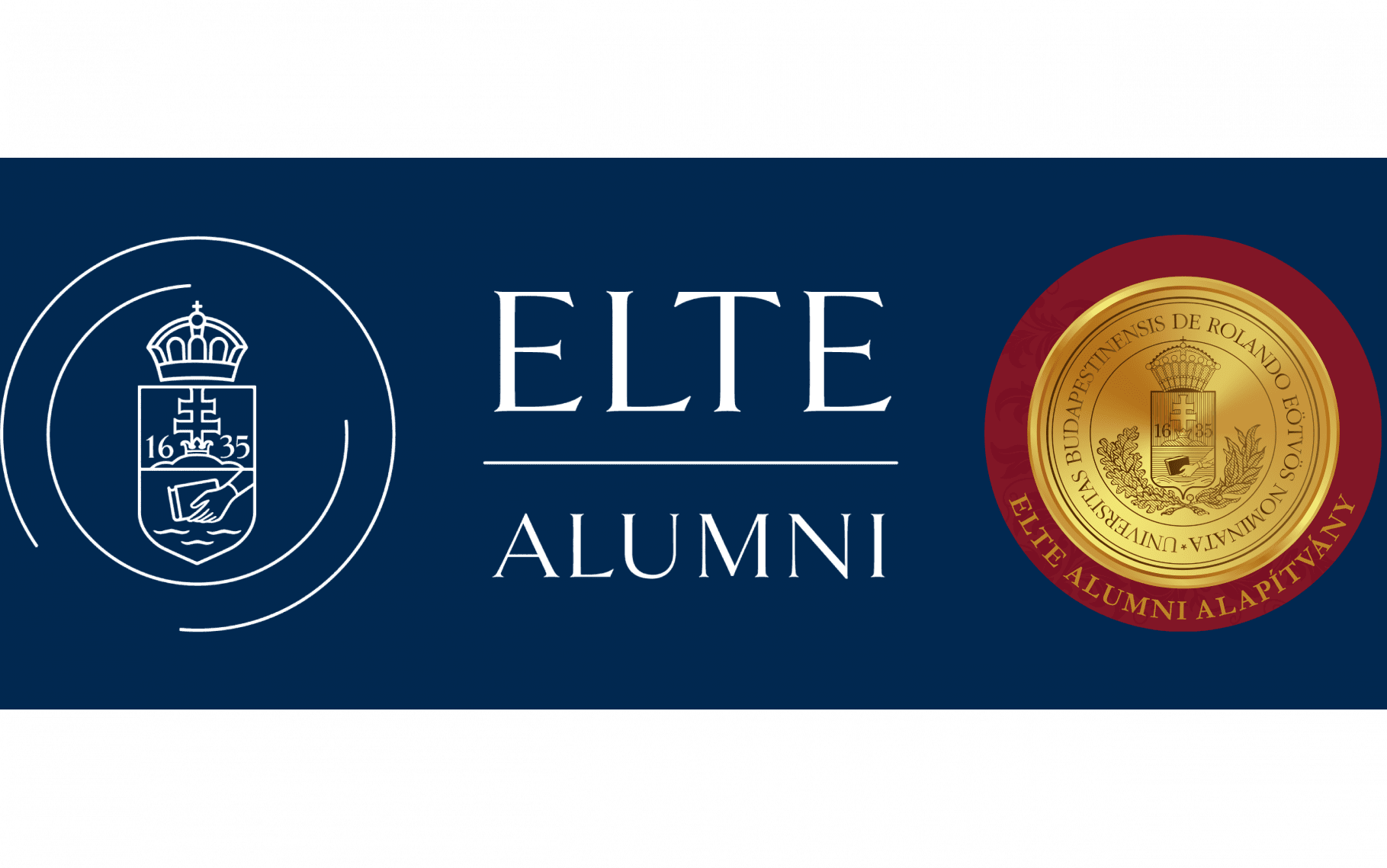Chapter event - ELTE Alumni Academy: The second season of the What’s new in science lecture series
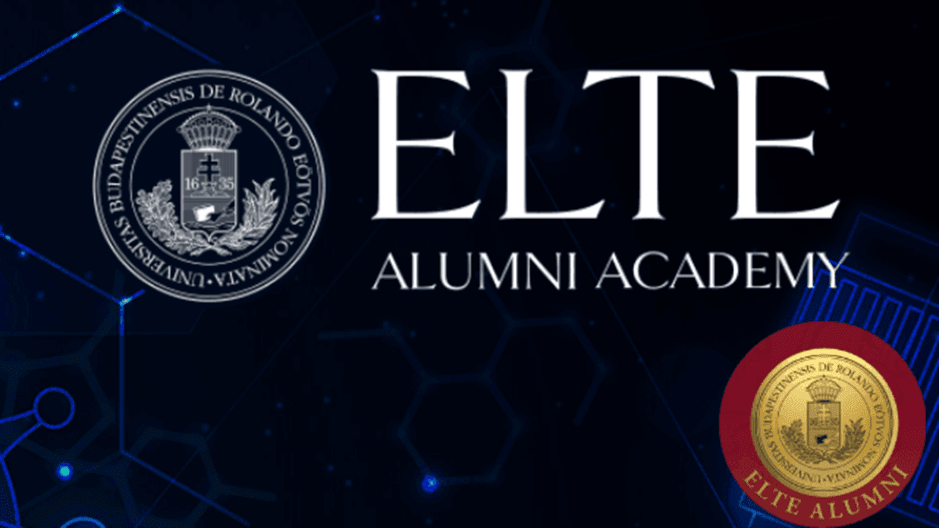
Last year, ELTE launched ELTE Alumni Academy, which is organized by the International Alumni Chapter. The International Alumni Chapter is planning various (currently online) series of events within the framework of ELTE Alumni Academy. All of the events are going to be held in English. Some of these online events will be available to anyone interested, while others will be designed specifically for international alumni members at ELTE.
The first series of events the popular-scientific lecture series titled “What’s new in science” started in April 2021. In this series, the International Alumni Chapter organizes lectures held by ELTE professors, specifically for international alumni members of the University and anyone interested. The topics for the lectures all revolve around science. Last academic year, the lectures detailed the effects of the pandemic situation on education. This academic year, the lectures revolve around the theme of the Central European Network, namely “Central-Europe: what unites and divides us?”. The lectures were made possible with support from the ELTE Alumni Centre.
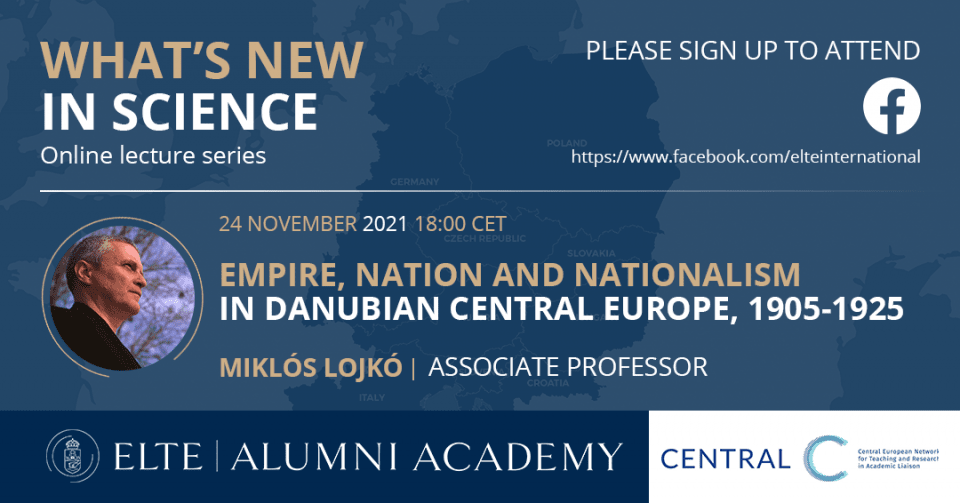
On 24 November, Dr. Miklós Lojkó, Habil. Assistant Professor held the first lecture of this academic year. Miklós Lojkó works at the Department of English Studies, at the Faculty of Humanities, ELTE. The Professor graduated with dual degrees in English and History at Eötvös Loránd University in 1987. The combination of these two broad fields of scholarship has dominated his professional career ever since. Miklós Lojkó has been teaching British and American history at ELTE since 1989 with extended periods of leave for the duration of further studies and research. He spent most of the 1990s with postgraduate research at the universities of Oxford, London, and Cambridge. He was awarded a PhD in History at Cambridge University in 2001. Miklós Lojkó has been associate professor at the School of English and American Studies at Eötvös Loránd University since his habilitation at ELTE in 2011. One of his main fields of research and scholarly interest focuses on the diverse relationships and interactions between the United Kingdom and the United States on the one hand and the nations of the Central European region on the other hand, especially during the interwar years.
Dr. Miklós Lojkló discussed the following topic during his lecture: “Empire, Nation and Nationalism in Danubian Central Europe, 1905-1925”. The social, economic, and mental transformation of the Austro-Hungarian (Habsburg) Monarchy accelerated from the mid-1900s, rendering the settlement (Compromise) of 1867 between the Kingdom of Hungary and the Habsburg Imperial Crown increasingly difficult to maintain. This is amply illustrated by the “Great Defense Debate” and Army/nationality crisis in Hungarian parliamentary and popular politics from 1889 to 1912, where the contentious issues remained unresolved as war broke out in 1914. The lecture explained how World War I accelerated the centrifugal ethnic forces that eventually led to the disintegration of the large multi-ethnic empire. The second part of the presentation examined the first half decade of the new Central European system of small successor states.
Dr. Miklós Lojkó ’s presentation
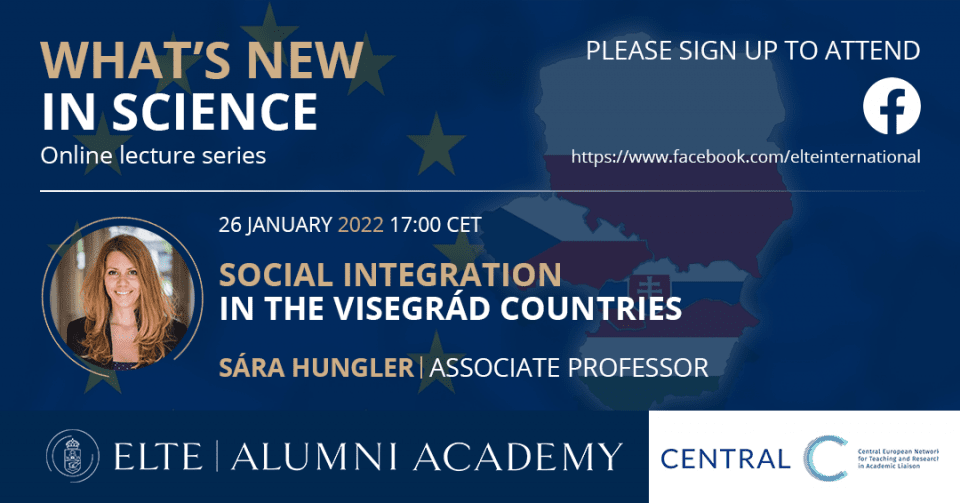
The second lecture on 26 January was held by Sára Hungler, Associate Professor at the Department of Labour Law and Social Law, Faculty of Law, ELTE. She earned her PhD in 2015 at the doctoral school of ELTE. She is currently pursuing her postgraduate studies with a focus on social integration under the European Pillar of Social Rights in the Visegrád countries. She is a member of the scientific council of Cross Border Benefits Alliance Europe (CBBA-Europe) and the European Association of Paritarian Institutions (AIEP); she is also a member of the Hungarian Association of Labour Lawyers. Dr. Hungler has been actively participating in several international research groups. Since 2021, she has been a member of the Hungarian Academy of Young Scientists and serves as a member of the committee of researchers with young children.
In her lecture, Sára Hungler discussed the following topic: “Social Integration in the Visegrád Countries”. The European Pillar of Social Rights proposed principles and legislative initiatives in the social domain aiming for better-performing economies and more equitable societies. The Professor explained that this initiative reveals the inherent problem of social integration that these regulatory areas have been exposed to domestic models and their respective diversity which followed from the different needs emerging at a national level. She went on to say that it is argued in political economy theory that the Visegrád countries belong to the same cluster, therefore it is presumed that they encounter similar problems during social integration. However, when we test this presumption with a functional comparative legal method, it is revealed that these four countries are less united form a social law point of view. The Professor explained that this regulatory diversity may increase adaptation pressure, triggering competition between the Visegrád countries and that this trend would ultimately lead to deregulation and to the lowering of social and employment protection level. The presentation demonstrated this theory through the examples of maternity and unemployment allowances, and discussed the regulatory differences in the social domain.
Dr. Sára Hungler’s presentation
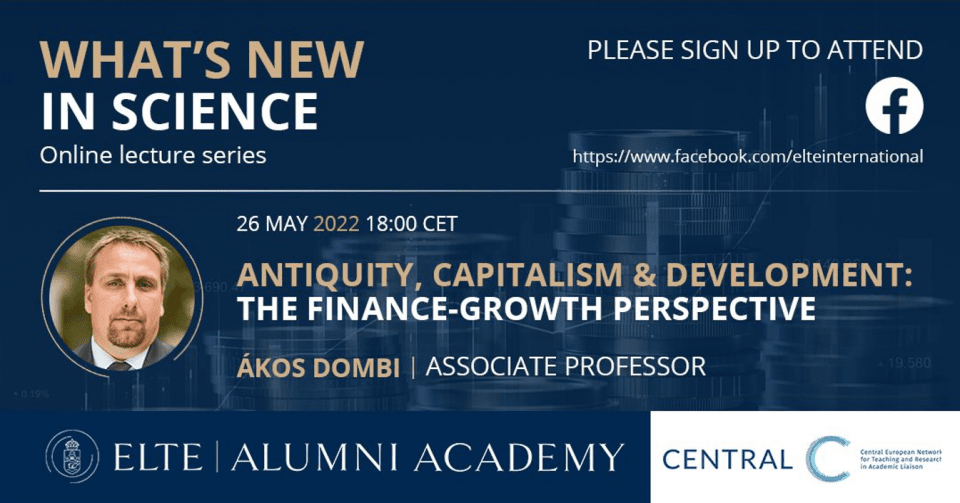
On 26 May, Dr. Ákos Dombi, Associate Professor at the Faculty of Economics held the third lecture of this academic year. Ákos Dombi graduated as a Doctor of Philosophy in Business and Management Sciences at Budapest University of Technology and Economics. Currently, he is the Head of the Department of Comparative Economics at the Faculty of Economics of ELTE. His research focuses on topics such as Economic Growth, Economic Policy in East-Central Europe, Growth Econometrics, Public Debt and Deep Roots of Economic Development. He did research stays at the University of Vienna, the Freie Universität Berlin, and the Poznan University of Economics and Business, among others. He is member of several professional associations, including the European Association for Comparative Economic Studies, the Association for Comparative Economic Studies, and the Royal Economic Society.
In his lecture entitled “Antiquity, Capitalism & Development: The Finance-Growth Perspective”, Dr. Dombi discussed the results of his and his co-authors', Theocharis N. Grigoriadis's (Freie Universität Berlin, Germany) and Junbing Zhu's (Henan University, China) study, which explored the impact of state antiquity on capitalism. In their study, they argue that extractive institutions may prevail in societies with ancient roots and offers the analysis of one particular channel through which these institutions may impair economic growth: the finance-growth nexus. The Assistant Professor proposes that in countries with ancient statehood, the financial sector might be captured by economic and political elites leading to a distorted finance-growth relationship.
Dr. Ákos Dombi ’s presentation
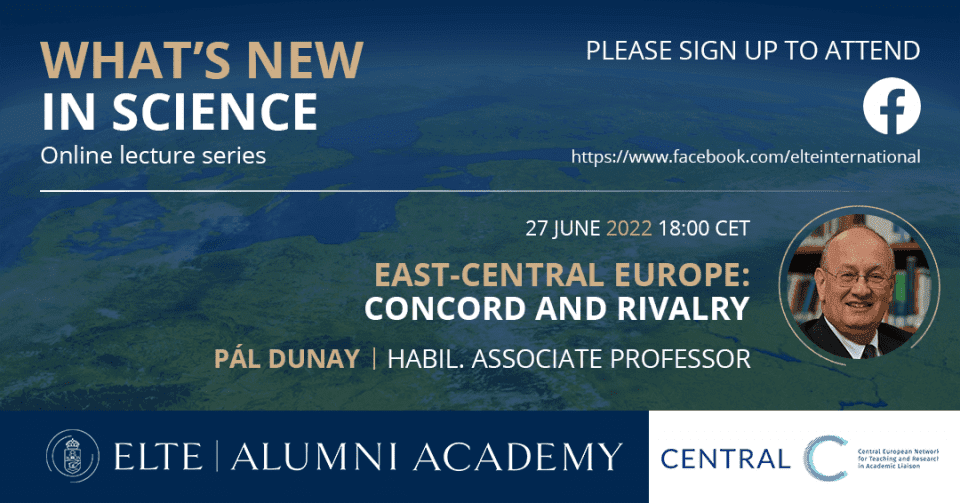
The last lecture in this season was held On 27 June, by Dr. Pál Dunay, Habil. Associate Professor at the Faculty of Social Sciences of ELTE. Pál Dunay’s professional career has been closely linked with Loránd Eötvös University. He studied law and political science at the Faculty of Law between 1977 and 1982 and got his LL.M. in the end of his studies. He stayed on the Faculty of Law and was a junior researcher and later assistant professor at the International Law Department between 1982 and 1996. In the meantime, he got a dr universitatis degree in international law in 1991, a decade later, he defended his PhD at the Budapest University of Economics (now Corvinus University) and got his habilitation in 2016 in Sociology at the ELTE’s Faculty of Social Sciences where he has been teaching as an associate professor (earlier assistant professor) at the Institute of Political and International Studies since 2008. . Since 1996, Pal Dunay has been living and working outside Hungary. He worked for 15 years at the Geneva Centre for Security Policy (1996-2004, 2007-2014), for two and a half at the Stockholm International Peace Research Institute (SIPRI) between July 2004 and February 2007, was Director of the OSCE Academy in Bishkek between 2014 and 2016 and has been working at the George C. Marshall European Center for Security Studies since.
In his lecture entitled “Relations in East-Central Europe: Historical and Current Concord and Rivalry”, Dr. Dunay explained that political geography is changeable and that states in each other’s vicinity may have changeable relations, which applies to East-central Europe that has been characterized by the coexistence of small nation-states since the end of empires in the end of World War.
The area, once called Europe-in-Between (Zwischeneuropa) by the first president of Czechoslovakia Thomas Masaryk, was under the influence of various great powers in the last more than a century. This requires innovative positioning in the international system, including intra-regional relations among the states. It is necessary to address the evolution of international relations in East-central Europe with an emphasis of the countries named as members of the Visegrad group. Dr. Dunay went explained that this relationship since the end of the 1940s has been based on regime similarity. However, the cooperation between the late 1940s and the late 1980s was very different from that of the last thirty years in two senses: First, during the communist regimes cooperation was confined to interaction among elites, and second, had an epi-centre, the Soviet Union, with the imposition of its political, social and economic system.
The Associate Professor went on to say that the situation is different since the 1990s. First, the political, social and economic system’s similarity is based on a voluntary choice, and second, the epi-centre is also voluntarily identical, and it is the European Union and NATO. Dr. Dunay explained that deeper-seated cooperation does not exclude some limited rivalry alongside with cooperation be it l’art-pour l’art, or based on the discord of objective interests. He said that disagreements are often amplified (good news is no news) but bearing in mind the size of three states of four has solid foundations. The Visegrad framework also has some elitist tendency in its exclusivity. According to the Professor, it is worth taking a look where the set of bilateral cooperations and the most important multilateral cooperation is heading in light of political and political science analysis both as far as regional and broad-ranging international relations are concerned.
Dr. Pál Dunay's lecture will be uploaded to YouTube soon.

Comments0
Please log in to see or add a comment
Suggested Articles
